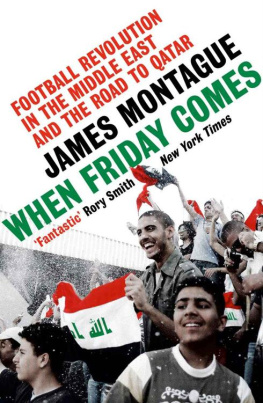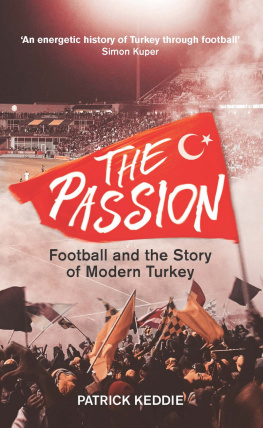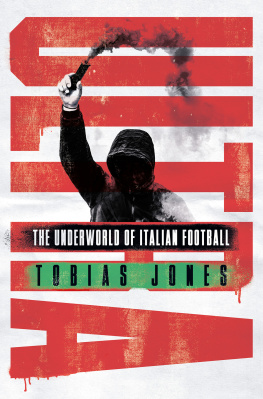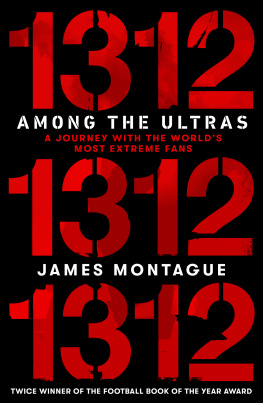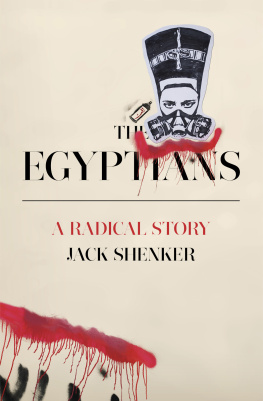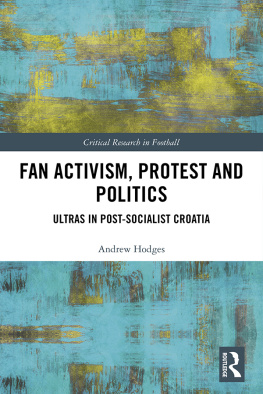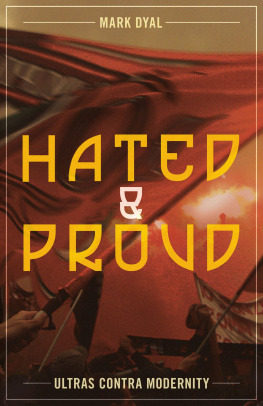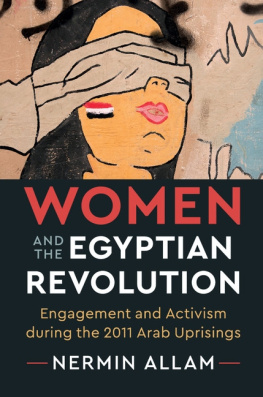This electronic edition published in 2019 by
The American University in Cairo Press
113 Sharia Kasr el Aini, Cairo, Egypt
200 Park Ave., Suite 1700 New York, NY 10166
www.aucpress.com
Copyright 2019 by Ronnie Close
All rights reserved. No part of this publication may be reproduced, stored in a retrieval system, or transmitted in any form or by any means, electronic, mechanical, photocopying, recording, or otherwise, without the prior written permission of the publisher.
ISBN 978 977 416 921 2
eISBN 978 1 61797 958 3
Version 1
INTRODUCTION
I encountered the Ultras soon after my arrival in Egypt. I remember the sunny February morning when I heard the news about Port Saidseventy-two massacred. It was a year after the revolutionary events of 2011, when the smell of teargas once again permeated around Cairos downtown streets. In the days that followed, I took my camera to the demonstrations held over the Ultras fatalities and met cheering local football fans. In this carnival-like atmosphere, beset by anger, all I experienced were boisterous pulsating crowds, a kind of chorographic communitythe fusion of football stadiums with street politics. The atmosphere was impulsive, as the crowds carried hundreds of flags and images of those killed and injured. It was also sobering to see family members display these images, and to realize that this was about more than football. From outside al-Ahly club, I began a six-year journey, reflected in this book, to convey the beguiling mix of revolutionary impulse with the extraordinary vitality and vulnerability of this time.
This book explores the short history of the Cairo Ultras in Egypt as a collective movement that became part of the momentous street politics that overthrew an autocratic ruler. Formed in 2007, the Ultras Ahlawy and Ultras White Knights became key actors in the revolutionary opposition against Hosni Mubaraks thirty-year rule. His dramatic removal in early 2011 was part of a tidal wave of widespread revolt across the Middle East and North Africa that affected the world. However, in the violent turmoil that followed, the Ultras have been locked into a bitter conflict with the Egyptian security state. This led to the horrific deaths of seventy-two fans in the Port Said massacre alone, and the imprisonment of many Ultras in Egypts notorious prison system. Football is a popular force in Egypt, and world famous players such as Mohamed Salah have inspired a younger generation beyond the quagmire of national politics.
Cultural practices are at the core of the Ultras sense of community, and their activities can be seen as a form of resistance against mainstream sports culture. This fan phenomenon in Cairo has challenged the football media spectacle and the rigid structures of the country in remarkable ways. Embodying a visceral imaginationhuman and libidinalthe Ultras pulsated stadium terraces with group displays of banners, flares, chanting, and dancing. On the football terraces, choreographed body movements unified the Ultras in Sufi-like rituals, taking hold as collective experiences, and transforming soccer into an ecstatic event. In this way, football culture can remind us of the universal appeal of sport, and its role in uniting people and dissolving differences.
This book starts with a detailed profile of the Cairo Ultras, and expands outward to look at other marginal and autonomous collectives. In their own way, these football fans have developed a distinctive social history and become wrapped up in radical street politics on a global stage in the lead up to a brutal military crackdown. The story of the Ultras begins at local matches. In this space, aesthetic experience is key to the group creativity, a form of the utopian impulse to dissolve labor and play into daily life. The writings of philosopher Jacques Rancire are essential to qualify the concept of dissensus, and to position the Ultras phenomenon as a process. The logic of dissensus is in disruption that is a counter-point to consensual politics. Dissensus does not accept police order, that is, the conventions for how to behave in a given society at a particular time, as underwritten by hierarchy. Rather, dissensus sets out to challenge such an order, because it acts under the presupposition of ones own equality and common experience.
This book is concerned with interpreting and expressing what is inscribed in marginal football communities. Sport is often thought of as a regulatory device to serve the status quo. However, many soccer cultures repurpose fan behavior as a form of resisting regressive politics. In the case of Egypt, the Ultras have offered alternative modes of being, in contestation over the corrupting influence of the patriarchal order that is personified by military rulers and their networks of business cronies. The heterogeneous Ultras football organizations are leisure-based collectives, at times socially progressive agents, who can embolden sporting communities as self-organizing, sustaining units.
This book is divided into six themed chapters. Chapter One looks at the political history of football in Egypt and, most recently, the emergence of the Ultras as a social phenomenon over the last decade, within the rich heritage of football-based activism. This chapter provides important context, allowing the reader to appreciate the focus of the book on exploring how football in Egypt has, in many ways, always been political. This leads to the role that Ultras groups played in the historic 25 January 2011 uprising, a revolt against long-standing ruler Hosni Mubarak.
Chapter Two examines the tragic events surrounding the Port Said massacre in 2012. This incident was a key factor in the formation of the unique political identity of the Ultras football-based movement, and the demise of hope among a revolutionary generation. The catastrophic event was severely felt by Ultras members and those within the wider street-activist culture. In addition, twenty-two comrades of the other Cairo organization, Ultras White Knights (UWK), were killed in a violent clash with security forces at a domestic league fixture in 2015.
Both of Cairos Ultras groups have been harassed and repressed by the regime of Abd al-Fattah al-Sisi, which has used emergency legislation against them.
Chapter Three more broadly explores the common identity of football cultures in different parts of the world. The solidarity expressed by Glasgow Celtics Ultras fans for the Palestinian cause provides a framework to examine the political activism embedded in football cultures in general. The political theory of dissensus is interwoven into the discussion as a key concept that undermines the perception of hegemonic authority. The word hooligan often predisposes the Ultras as mindless thugs, and this section of the book looks at how collective sports culture has been utilized as an imaginative commons.


